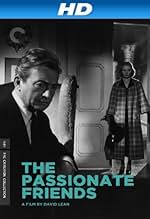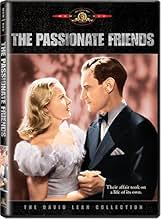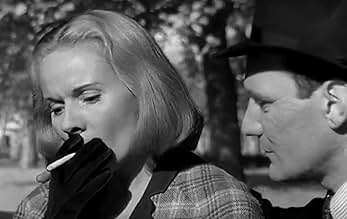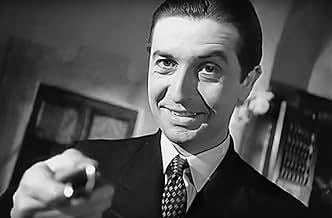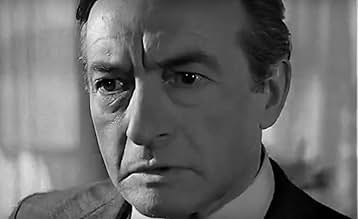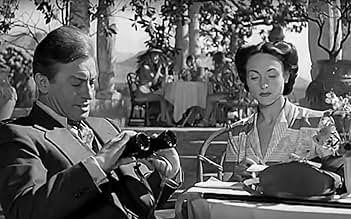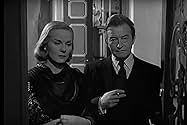VALUTAZIONE IMDb
7,2/10
3318
LA TUA VALUTAZIONE
Una donna incontra un uomo il quale lei fifiutò diversi anni prima.Una donna incontra un uomo il quale lei fifiutò diversi anni prima.Una donna incontra un uomo il quale lei fifiutò diversi anni prima.
- Premi
- 2 vittorie e 1 candidatura in totale
Hélène Burls
- Flowerwoman
- (non citato nei titoli originali)
Amy Dalby
- Lady on Underground
- (non citato nei titoli originali)
Lisa Daniely
- Cinema Usherette
- (non citato nei titoli originali)
Max Earle
- Third Man - Albert Hall
- (non citato nei titoli originali)
Edward Evans
- Underground ticket officer
- (non citato nei titoli originali)
Arthur Howard
- Smith - Butler
- (non citato nei titoli originali)
John Huson
- First Man - Albert Hall
- (non citato nei titoli originali)
Wilfrid Hyde-White
- Lawyer
- (non citato nei titoli originali)
Charles Lloyd Pack
- Man Drinking with Stratton
- (non citato nei titoli originali)
Guido Lorraine
- Hotel Manager
- (non citato nei titoli originali)
Ina Pelly
- Second Woman - Albert Hall
- (non citato nei titoli originali)
Helen Piers
- First Woman - Albert Hall
- (non citato nei titoli originali)
Marcel Poncin
- Hall Porter
- (non citato nei titoli originali)
Recensioni in evidenza
It's easy to associate "The Passionate Friends" to its detriment with "Brief Encounter"; in its voice-over/flashback structure, in its themes of suicide and adultery, and of course in the casting of Trevor Howard. But in a sense -- although not, unfortunately, an entirely successful one -- in a sense, the later film is an attempt to do something very different with this source material. At the most basic level the two pictures have virtually nothing in common: "Brief Encounter" is a story of renunciation and unselfishness, of ordinary lives in an unromantic setting, of heartbreak from a painfully honest narrator. "The Passionate Friends" (a title never really explained) revolves ultimately around selfishness and self-deception, lavish trappings and a shallow surface gloss epitomised by the cheesy 'Swiss' tourist music that backs the initial establishing shots.
Mary's swelling soft-focus memories of her grand passion are deflated by jarring little jabs from the director, in what I suspect is intended as an alert to the viewer that her romantic-seeming situation is not quite what it seems -- in effect, she is an unreliable narrator, and the pay-off comes when she perceives, finally and appallingly, what she really is and what she has done. It is a climax worth waiting for, but it is slow to arrive; and the subtle wrongness in the love affair, the self-dramatisation and lack of authenticity (whether or not these are deliberate attempts to undermine her presentation of events, as hindsight suggests they may be) until then tend to come across simply as unconvincing story-telling.
It is never clear just what Mary means by her assertion that she wants to belong to herself and not to any lover. By the end, however, it is all too apparent that this mantra, reminiscent of the "Can't tie me down, babe" slogans of the (male) serial shaggers of the Sixties, is every bit as self-indulgent a female pose. She is in love with the idea of being in love: playing at it, day-dreaming transgressions. But when reality strikes, the whole game is exposed as a silly, hugely destructive fantasy.
After the first showdown with her husband (which we are specifically, and with hindsight, significantly, not allowed to witness), she warns Steven that she is not truly a good person to love. We -- and he -- do not then either understand or believe her; but she is right. She is not prepared to give herself, in modern parlance to 'commit': but she will not let go either.
The trouble for me is that for most of its running length the film seems to be simply a somewhat off-kilter account of an adulterous affair, over-ponderous, with clumsy use of music and heavily ironic dialogue. (The cinema audience, young and out for a good time, spent rather more time giggling than I assume the director intended.) The cinematic tricks that are present, such as the abrupt cuts in the taxi scene, the nested flashback structure, or the montage of advertisements in the Tube station reading "Keep Smiling", "Strength" and "Saved", too often seem awkward or labouring the obvious. If the idea was indeed to subtly undermine audience preconceptions, it doesn't really work -- there is no equivalent here to the stunning shift in perception that exists between the opening sequence of "Brief Encounter" and the final unwinding of the flashback.
As the ambiguous Mary, Ann Todd is a strangely elusive presence. The character is at the heart of the plot and has the lion's share of screen time, and yet most of that time it's hard to get a grip on her beyond the superficial. I'm still not sure whether this is an intended result of the acting and/or direction, or a flaw in the film.
Trevor Howard carries off the role of the unfortunate Steven with angular charm and provides the requisite sense of bewildered decency; but as others have rightly remarked, it is Claude Rains, in what might appear a largely peripheral role, who steals the show. Rich, older, physically unprepossessing, and mildly affectionate towards his wife when he can spare a moment from the financial markets, Howard Justin is the face of moneyed security versus the romantic passion promised by Mary's once-and-future lover, and as such represents the trappings of a marriage of convenience rather than an actual human being. But almost from the beginning we are made aware that he is neither unintelligent nor unobservant; later we discover that he is not as complaisant as the other couple have assumed, and finally, that he can be hurt -- and can love -- as deeply as any other man. Over a mere handful of scenes in the course of the film Claude Rains manages to convey more tension and real emotional presence than anyone else, and it is this contribution that makes the final twist both plausible and satisfying.
"The Passionate Friends" is not the great film that I feel it is perhaps trying to be; but it is certainly not an abortive carbon-copy of "Brief Encounter". The resolution of the film is starkly effective and is worth sitting through a glossy and rather uninspired beginning for: as a whole, it can be seen as an honourable failure.
(Edit: for what it's worth, in the month since I saw this film I haven't been able to get it out of my head...)
Mary's swelling soft-focus memories of her grand passion are deflated by jarring little jabs from the director, in what I suspect is intended as an alert to the viewer that her romantic-seeming situation is not quite what it seems -- in effect, she is an unreliable narrator, and the pay-off comes when she perceives, finally and appallingly, what she really is and what she has done. It is a climax worth waiting for, but it is slow to arrive; and the subtle wrongness in the love affair, the self-dramatisation and lack of authenticity (whether or not these are deliberate attempts to undermine her presentation of events, as hindsight suggests they may be) until then tend to come across simply as unconvincing story-telling.
It is never clear just what Mary means by her assertion that she wants to belong to herself and not to any lover. By the end, however, it is all too apparent that this mantra, reminiscent of the "Can't tie me down, babe" slogans of the (male) serial shaggers of the Sixties, is every bit as self-indulgent a female pose. She is in love with the idea of being in love: playing at it, day-dreaming transgressions. But when reality strikes, the whole game is exposed as a silly, hugely destructive fantasy.
After the first showdown with her husband (which we are specifically, and with hindsight, significantly, not allowed to witness), she warns Steven that she is not truly a good person to love. We -- and he -- do not then either understand or believe her; but she is right. She is not prepared to give herself, in modern parlance to 'commit': but she will not let go either.
The trouble for me is that for most of its running length the film seems to be simply a somewhat off-kilter account of an adulterous affair, over-ponderous, with clumsy use of music and heavily ironic dialogue. (The cinema audience, young and out for a good time, spent rather more time giggling than I assume the director intended.) The cinematic tricks that are present, such as the abrupt cuts in the taxi scene, the nested flashback structure, or the montage of advertisements in the Tube station reading "Keep Smiling", "Strength" and "Saved", too often seem awkward or labouring the obvious. If the idea was indeed to subtly undermine audience preconceptions, it doesn't really work -- there is no equivalent here to the stunning shift in perception that exists between the opening sequence of "Brief Encounter" and the final unwinding of the flashback.
As the ambiguous Mary, Ann Todd is a strangely elusive presence. The character is at the heart of the plot and has the lion's share of screen time, and yet most of that time it's hard to get a grip on her beyond the superficial. I'm still not sure whether this is an intended result of the acting and/or direction, or a flaw in the film.
Trevor Howard carries off the role of the unfortunate Steven with angular charm and provides the requisite sense of bewildered decency; but as others have rightly remarked, it is Claude Rains, in what might appear a largely peripheral role, who steals the show. Rich, older, physically unprepossessing, and mildly affectionate towards his wife when he can spare a moment from the financial markets, Howard Justin is the face of moneyed security versus the romantic passion promised by Mary's once-and-future lover, and as such represents the trappings of a marriage of convenience rather than an actual human being. But almost from the beginning we are made aware that he is neither unintelligent nor unobservant; later we discover that he is not as complaisant as the other couple have assumed, and finally, that he can be hurt -- and can love -- as deeply as any other man. Over a mere handful of scenes in the course of the film Claude Rains manages to convey more tension and real emotional presence than anyone else, and it is this contribution that makes the final twist both plausible and satisfying.
"The Passionate Friends" is not the great film that I feel it is perhaps trying to be; but it is certainly not an abortive carbon-copy of "Brief Encounter". The resolution of the film is starkly effective and is worth sitting through a glossy and rather uninspired beginning for: as a whole, it can be seen as an honourable failure.
(Edit: for what it's worth, in the month since I saw this film I haven't been able to get it out of my head...)
This Rank/Cineguild production directed by David Lean is based on a novel by H G Wells, here adapted by Lean and Stanley Haynes, though with a screenplay credited to Eric Ambler. Although the plot is about a triangle, Lean's focus is on Ann Todd as the woman between two men, her husband and the man who was her first love but whom she refused to marry. Her situation is presented in an exchange between the man, Trevor Howard and Todd - "If two people really love each other they want to be together. They want to belong to each other", Todd - "I want to belong to myself", "Then your life will be a failure". However in the tradition of upper class Brits, Todd's life of failure means a marriage to a successful banker, Claude Rains. The narrative has an unusual triple flashback structure, which is perhaps why it needed three writers, with the present being narrated by Todd with the prospect of a divorce, and flashbacks to the vacation in Switzerland where the instigating incident occurs, Todd's memory/flashback of 9 years earlier re-meeting Howard, and small memories of their first romance. The initial meeting is tainted by lines like Todd's "Why can't we be in love without the clutching and gripping", though later Todd admits to "not being a very good person". Howard's character has his ambiguities too, being a university biology lecturer who knowingly has an affair with a married woman. The infidelity gets a funny spin by Rains' business with Germany and Italy pre-WW2, and Rains saying he has "a taste for intrigue", though the film being made post-WW2 allows him to speak of the "Teutonic hysteria" of the Germans. In spite of some of Lean's technical touches, the thing that de-passionates the situation is Todd, in her first film for her then husband. Whilst at times she resembles Garbo, the rather butch Todd lacks the divine one's expressiveness, with Lean reduced to filming her running from Howard in slow motion to give her some lyricism. All three of the leads are oddly lit indelicately, perhaps to suggest that all this passage of time has aged them, but this with Todd, adds to the destruction of romantic intent. Lean provides a vocal montage of telephone conversations, cuts from a kiss to a bunch of flowers, doors slamming to a typewriter slide of the divorce document, gives Rains a cuckold paranoid montage, and has a "Keep Smiling" poster featured in the background of the climactic scene in the train underground, though the idea of Todd not buying a ticket before she enters rather pre-empts things. Rains has the audience empathy, even if the odd way he stand in a ¾ pose when he confronts someone seems silly. He is the more emotional of the three, but because of the British standards of polite behaviour, his yells are either heard off-camera or with his back to us. The best scene reads as Hitchcock-influenced with Rains dictating to his secretary and Lean continually cutting to a pair of tickets to a play Todd and Howard go to see. The title First Love gets a comic payoff when we hear it is a musical with a fatuous title song.
6sol-
A rather early entry in David Lean's career, his directing skills show through in some dramatic moments that require intense atmosphere. Nevertheless, the film is not the best example of Lean's abilities - both before and after it he directed superior productions - but this one is still okay viewing. With many flashbacks melded in with the plot, some are better done than others, and likewise, sequences showing the thoughts and dreams of the characters vary in effectiveness. There is a memorable sequence that features multiple telephone tracks, and there are also a few other neat tricks in the mix. The cinematography is quite good, and the cast keeps the film at an interesting level. Still, it is primarily of interest to followers of Lean's work.
This film surprised me a lot. I watched it merely out of curiosity; by the end of the film, I was struck by Ann Todd's performance and had to watch the film twice back-to-back. She expressed her character's inner turmoil so well that I wonder if she was playing herself. I profess I don't watch a lot of movies, barely up to 2,000 films. However, that is only because I am damn picky.
This is rather a mature story of romance. How a relationship could evolve from a marriage of convenience to a real thing of beauty between two people. How one's maturity could evolve from a real thing of passion to a mental state of contentment and stability. It's also a story of irrational jealousy that could potentially negate a prosperous family life.
This is a good example of a film where filmmakers do not have to resort to gratuitous, meretricious scenes to portray lust or passion.
This is rather a mature story of romance. How a relationship could evolve from a marriage of convenience to a real thing of beauty between two people. How one's maturity could evolve from a real thing of passion to a mental state of contentment and stability. It's also a story of irrational jealousy that could potentially negate a prosperous family life.
This is a good example of a film where filmmakers do not have to resort to gratuitous, meretricious scenes to portray lust or passion.
The Passionate Friends is the first of three films that director David Lean made with Ann Todd in and she gives a fine performance in this mannered British melodrama that evokes in ways two other popular British films of the era, Lean's Brief Encounter and the Todd starring The Seventh Veil.
Former lovers Mary Justin (Todd) and Steven Stratton (Trevor Howard) meet accidentally at a New year's party and rekindle lost feelings. Trouble is she is married to a wealthy banker Howard Justin (Claude Rains) and Stratton's in a committed relationship. Justin discovers the affair however and puts an end to it. Nine years pass and they meet again while vacationing. Stratton is now married with kids but Howard thinks otherwise and files for divorce. Mary becomes desperate and suicidal.
With quality performances (especially Rains) from all of the leads The Passionate Friends is credible melodrama that overachieves with Lean displaying his superb grasp of film language, employing jump cuts, montage and juxtaposition for maximum effect. With a few Hitchcock like flourishes along the way he does an excellent job of keeping the audience guessing right up until the final minutes. It is this subtle triumph of form that makes The Passionate Friends a superior example of its genre.
Former lovers Mary Justin (Todd) and Steven Stratton (Trevor Howard) meet accidentally at a New year's party and rekindle lost feelings. Trouble is she is married to a wealthy banker Howard Justin (Claude Rains) and Stratton's in a committed relationship. Justin discovers the affair however and puts an end to it. Nine years pass and they meet again while vacationing. Stratton is now married with kids but Howard thinks otherwise and files for divorce. Mary becomes desperate and suicidal.
With quality performances (especially Rains) from all of the leads The Passionate Friends is credible melodrama that overachieves with Lean displaying his superb grasp of film language, employing jump cuts, montage and juxtaposition for maximum effect. With a few Hitchcock like flourishes along the way he does an excellent job of keeping the audience guessing right up until the final minutes. It is this subtle triumph of form that makes The Passionate Friends a superior example of its genre.
Lo sapevi?
- QuizThis movie is based on the 1913 novel "The Passionate Friends" by H. G. Wells, who also wrote "The Invisible Man", which was made into a 1933 hit movie starring Claude Rains, one of the stars in this movie.
- BlooperWhen Steven barges into Howard's office, he is shown starting to close the door, followed by the sound of a door closing. However, in the subsequent shot, the door is open again.
- Citazioni
Mary Justin: I'm not a very good person, Steven. I wanted your love - and I wanted Howard's affection and the security he could give me.
Professor Steven Stratton: I can give you security too, and more than affection.
Mary Justin: You don't really know me at all. My love isn't worth very much.
- ConnessioniReferenced in Il filo nascosto (2017)
I più visti
Accedi per valutare e creare un elenco di titoli salvati per ottenere consigli personalizzati
- How long is The Passionate Friends?Powered by Alexa
Dettagli
- Data di uscita
- Paese di origine
- Lingue
- Celebre anche come
- Apasionada
- Luoghi delle riprese
- Le Brévent, Chamonix, Haute-Savoie, Francia(cable car outing at Brévent in front of Pic du Midi)
- Azienda produttrice
- Vedi altri crediti dell’azienda su IMDbPro
Botteghino
- Lordo in tutto il mondo
- 40.335 USD
- Tempo di esecuzione1 ora 35 minuti
- Colore
- Proporzioni
- 1.37 : 1
Contribuisci a questa pagina
Suggerisci una modifica o aggiungi i contenuti mancanti

Divario superiore
By what name was Sogno d'amanti (1949) officially released in India in English?
Rispondi

